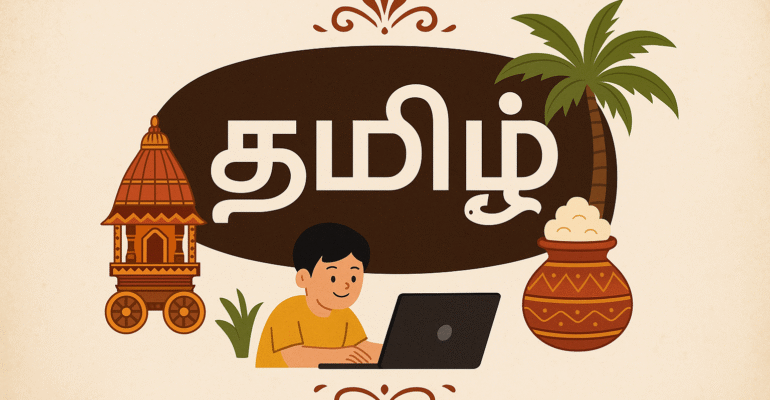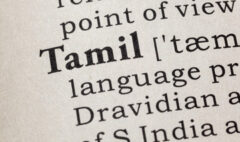How to Talk About Your Dreams and Aspirations in Tamil
How to Talk About Your Dreams and Aspirations in Tamil
How to Talk About Your Dreams and Aspirations in Tamil: A Guide to Your Future Self
One of the most profound and connecting of all human conversations is the one about our dreams for the future. Talking about our hopes, our ambitions, and our aspirations is how we share our innermost selves with others. It is a conversation that is filled with optimism, with passion, and with the very essence of who we want to become. For a student of the Tamil language, learning how to have this conversation is a major and wonderfully empowering step. It moves you beyond talking about what you *did* yesterday and into the exciting realm of what you *want to do* tomorrow. Learning the language for talking about dreams in Tamil is a journey into a more advanced and more personal form of self-expression.
This guide is designed to provide you with the essential vocabulary and the simple grammatical structures you need to articulate your Tamil aspirations (லட்சியங்கள் – laṭciyaṅkaḷ). We will cover how to talk about your future plans in Tamil, from your career goals to your personal dreams. For parents, encouraging your child to talk about their personal goals in Tamil is a powerful way to help them to think about their future and to build their confidence in the language at the same time.
Part 1: The Core Vocabulary of Ambition
Let’s begin with the foundational words that are the building blocks of any conversation about the future.
- Dream / Aspiration – கனவு (Kaṉavu) / லட்சியம் (Laṭciyam)
- Goal / Aim – இலக்கு (Ilakku) or குறிக்கோள் (Kuṟikkōḷ)
- Future – எதிர்காலம் (Etirkālam)
- Life – வாழ்க்கை (Vāḻkkai)
- Plan – திட்டம் (Tiṭṭam)
- Desire / Wish – ஆசை (Ācai)
- Hope – நம்பிக்கை (Nampikkai)
- Effort / Hard work – முயற்சி (Muyaṟci) / கடின உழைப்பு (Kaṭiṉa uḻaippu)
- Success – வெற்றி (Veṟṟi)
Part 2: The Grammar of the Future – Expressing “I Want to Become…”
The most common way to talk about your career aspirations is to talk about what you want to “become.” The key verb phrase for this is “ஆக விரும்புகிறேன்” (āka virumpukiṟēṉ), which means “I want to become.”
Common Career Aspirations:
- Doctor – மருத்துவர் (Maruttuvar)
- Engineer – பொறியாளர் (Poṟiyāḷar)
- Teacher – ஆசிரியர் (Āciriyar)
- Scientist – விஞ்ஞானி (Viññāṉi)
- Lawyer – வழக்கறிஞர் (Vaḻakkaṟiñar)
– Businessman / Businesswoman – தொழிலதிபர் (Toḻilatipar)
– Artist – கலைஞர் (Kalaiñar)
How to Build the Sentence:
The structure is: “நான் எதிர்காலத்தில் ஒரு [Profession] ஆக விரும்புகிறேன்.” (Nāṉ etirkālattil oru [Profession] āka virumpukiṟēṉ.) – “In the future, I want to become a [Profession].”
Examples:
- “I want to become a doctor.” – “நான் ஒரு மருத்துவர் ஆக விரும்புகிறேன்.” (Nāṉ oru maruttuvar āka virumpukiṟēṉ.)
- “My daughter wants to become a scientist.” – “என் மகள் ஒரு விஞ்ஞானி ஆக விரும்புகிறாள்.” (Eṉ makaḷ oru viññāṉi āka virumpukiṟāḷ.) – Note the change in the verb ending for “she wants.”
Part 3: Expressing “I Want to Do…”
For talking about your more general life goals and plans, you will often want to say that you want to “do” something. The key verb phrase for this is “செய்ய விரும்புகிறேன்” (seyya virumpukiṟēṉ), which means “I want to do.”
Common Life Goals:
- To help people – மக்களுக்கு உதவுவது (makkaḷukku utavuvatu)
- To start a business – ஒரு தொழில் தொடங்குவது (oru toḻil toṭaṅkuvatu)
- To travel the world – உலகைச் சுற்றிப் பார்ப்பது (ulakaic cuṟṟip pārppatu)
- To build a house – ஒரு வீடு கட்டுவது (oru vīṭu kaṭṭuvatu)
- To learn a new language – ஒரு புதிய மொழியைக் கற்றுக்கொள்வது (oru putiya moḻiyaik kaṟṟukkoḷvatu)
- To serve the country – நாட்டிற்கு சேவை செய்வது (nāṭṭiṟku cēvai ceyvatu)
How to Build the Sentence:
The structure is: “நான் … செய்ய விரும்புகிறேன்.” (Nāṉ … ceyya virumpukiṟēṉ.) – “I want to do…”
Examples:
- “I want to help poor people.” – “நான் ஏழை மக்களுக்கு உதவ விரும்புகிறேன்.” (Nāṉ ēḻai makkaḷukku utava virumpukiṟēṉ.)
- “My dream is to travel the world.” – “என் கனவு உலகைச் சுற்றிப் பார்ப்பது.” (Eṉ kaṉavu ulakaic cuṟṟip pārppatu.)
- “My goal is to build a big house for my parents.” – “என் இலக்கு என் பெற்றோருக்கு ஒரு பெரிய வீடு கட்டுவது.” (Eṉ ilakku eṉ peṟṟōrukku oru periya vīṭu kaṭṭuvatu.)
Part 4: Having a Conversation About the Future
Here are some simple questions and answers you can use to start talking about dreams in Tamil.
Questions to Ask:
- “What is your dream/aspiration?” – “உங்கள் கனவு/லட்சியம் என்ன?” (Uṅkaḷ kaṉavu/laṭciyam eṉṉa?)
- “What do you want to become in the future?” – “நீங்கள் எதிர்காலத்தில் என்ன ஆக விரும்புகிறீர்கள்?” (Nīṅkaḷ etirkālattil enṉa āka virumpukiṟīrkaḷ?)
- “What are your future plans?” – “உங்கள் எதிர்கால திட்டங்கள் என்ன?” (Uṅkaḷ etirkāla tiṭṭaṅkaḷ eṉṉa?)
A Sample Dialogue:
Teacher: “ரவி, உன் லட்சியம் என்ன?” (Ravi, uṉ laṭciyam eṉṉa?) – “Ravi, what is your aspiration?”
Ravi (a student): “நான் ஒரு விஞ்ஞானி ஆக விரும்புகிறேன், டீச்சர்.” (Nāṉ oru viññāṉi āka virumpukiṟēṉ, ṭīccar.) – “I want to become a scientist, Teacher.”
Teacher: “மிகவும் நல்லது. ஏன் விஞ்ஞானி ஆக விரும்புகிறாய்?” (Mikavum nallatu. Ēṉ viññāṉi āka virumpukiṟāy?) – “Very good. Why do you want to become a scientist?”
Ravi: “நான் புதிய விஷயங்களைக் கண்டுபிடிக்க விரும்புகிறேன். நான் என் நாட்டிற்கு சேவை செய்ய விரும்புகிறேன்.” (Nāṉ putiya viṣayaṅkaḷaik kaṇṭupiṭikka virumpukiṟēṉ. Nāṉ eṉ nāṭṭiṟku cēvai ceyya virumpukiṟēṉ.) – “I want to discover new things. I want to serve my country.”
Conclusion: The Language of Hope and Ambition
The conversation about our dreams is a conversation about hope. It is a powerful and deeply human form of communication. By learning how to talk about your Tamil aspirations, you are not just practicing your future tense verbs; you are learning to articulate your own identity and your hopes for your life in a new and beautiful language. This vocabulary for your future plans in Tamil is a toolkit for inspiration. Encouraging your child to think about and to voice their personal goals in Tamil is a powerful way to build their confidence, to strengthen their connection to the language, and to remind them that their future is a bright and open page, waiting for them to write their own incredible story.












